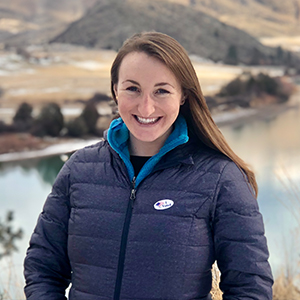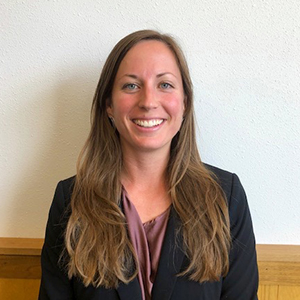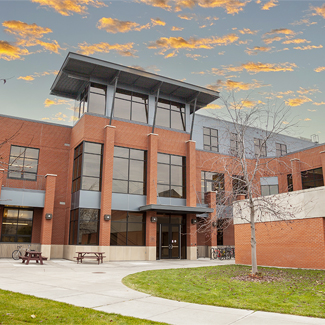Law Students Champion Rural Justice Through Research
April 28, 2021
In Fall 2020 the Blewett School of Law launched the Rural Justice Initiative (RJI) at the University of Montana with the goal of bringing to light largely overlooked aspects of criminal justice reform found among rural and Indigenous populations. The program offers interdisciplinary research and technical support to local, State and Tribal stakeholders engaged in evidence-based criminal justice policy and legislative reform. At the forefront of RJI’s efforts this spring have been the program’s three inaugural research assistants, law students Joy Barber, Kaia Keefe-Oates and Kirsten Gerbatsch.
Joy Barber
 Before law school Barber worked stints in AmeriCorps, held a career as a writing instructor in two-year colleges and volunteered her time and skills at a women’s pre-release center. In her work as a college instructor, Barber sometimes created homework packets to send to students in jail. And as a coach and mentor for the women’s pre-release center in Billings, there were times she met with inmates who needed parenting plans because getting to the center could be challenging.
Before law school Barber worked stints in AmeriCorps, held a career as a writing instructor in two-year colleges and volunteered her time and skills at a women’s pre-release center. In her work as a college instructor, Barber sometimes created homework packets to send to students in jail. And as a coach and mentor for the women’s pre-release center in Billings, there were times she met with inmates who needed parenting plans because getting to the center could be challenging.
“It made me deeply aware how vulnerable to the power of the criminal justice system these people’s dreams and goals were,” said Barber. “The criminal justice system means to support goals of rehabilitation and reducing recidivism, but it could do a lot better.”
In her work for RJI spring semester, Barber worked to create a statewide survey to investigate what pre-trial information is being collected and what pre-trial risk assessments are already being used in Montana. RJI is developing a repository of information that policy advocates lawmakers and local leadership can draw upon to make informed decisions.
“RJI seeks to fill an important gap in the research that exists about criminal justice reform,” she said. “Solutions are often not ‘one size fits all,’ and rural areas and Indian country have some different problems to solve and specific barriers to overcome. Ultimately, I think what that means for our communities is better solutions that fit their context and are informed by relevant data."
Kaia Keefe-Oates
 Like Barber, Keefe-Oates’ work experience before law school also inspired her to apply for the position with RJI.
Like Barber, Keefe-Oates’ work experience before law school also inspired her to apply for the position with RJI.
“I had worked in rural Illinois for Feeding America, in some incredibly impoverished areas and was interested in taking advantage of my time in Montana to further explore rural issues,” said Keefe-Oates. “This past summer working with CASA was my first eye-opening experience to criminal justice reform, and the RJI position has further opened my eyes to how intertwined poverty, family health and criminal justice are.”
While supporting Barber on the survey work, Keefe-Oates also conducted research for RJI on legislation passed by other states to increase jail data transparency. With little information regarding jail populations and their numbers increasing in rural areas such as Montana, this data becomes key for prisoner safety, accountability, research and reform. COVID-19, for example, illuminated the need for this information as outbreaks in jails and other correctional facilities became an issue across the country.
RJI recently provided Keefe-Oates’ research and feedback to a group drafting legislation this year for a jail data study bill.
“To me, RJI means acknowledging the different legal challenges that arise in rural areas versus non-rural areas and productively evaluating the differences,” said Keefe-Oates. “Even in our state, the differences between Missoula, Dillon and Judith Gap and the way the legal system impacts the inhabitants is drastic. RJI means looking at the problem and applying a different, rural lens."
Kirsten Gerbatsch
 Before coming to law school, Gerbatsch began paying close attention to criminal justice reform while working at the Montana Budget and Policy Center. As the Deputy Director of Communications, she gathered and interpreted data related to the impact of state budget changes on health, social services and the criminal justice system.
Before coming to law school, Gerbatsch began paying close attention to criminal justice reform while working at the Montana Budget and Policy Center. As the Deputy Director of Communications, she gathered and interpreted data related to the impact of state budget changes on health, social services and the criminal justice system.
“It helped me to develop a better understanding of and interest in the complex policy barriers facing rural communities and American Indians in Montana,” Gerbatsch said.
Once in law school, Gerbatsch’s experiences helped her further expand her understanding. During her 1L year, she supported the Honorable Brenda Gilbert in implementing the Sixth Judicial District Treatment Court serving Montana’s rural Park and Sweet Grass counties. The Treatment Court provided a sentencing alternative to repeat offenders struggling with substance use disorders and related behavioral health conditions. Gerbatsch also coordinated events for the National Lawyers Guild Week Against Mass Incarceration in order to host conversations about the bail system and reform efforts and American Indians’ disproportionate representation in our criminal justice system.
This spring Gerbatsch researched Alaska’s Pretrial Risk Assessment tool developed by the State of Alaska. The tool calculates whether a defendant is at low, moderate or high risk for failure to appear at trial or to commit another crime if the defendant is released pretrial. It also aids in the judge's decision regarding pretrial bail conditions. RJI is interested in Alaska’s pilot program because of the similarities between Alaska and Montana’s rural and Native populations and how it could provide valuable lessons for Montana.
“RJI is an opportunity to formulate evidence-based legislation in order to rebuild the systems meant to serve rural and Native families and communities,” said Gerbatsch.
